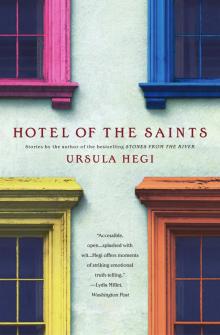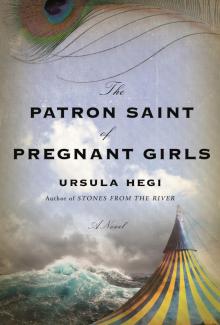- Home
- Ursula Hegi
The Worst Thing I've Done Page 2
The Worst Thing I've Done Read online
Page 2
Mason raised one hand to her throat, fingered the gold. “Who bought this for you?”
“I did.”
“I just don’t think a woman would buy that kind of necklace for herself.”
“You’re kidding. Right?”
“It’s the kind of gift a lover would buy for a woman.”
As she stared at his angular face with the wide mouth and pale skin, at his blue-black eyes and his blue-black curls, it amazed her how all the familiar added up to this stranger.
And she came right back at him. “A lover? Don’t you know that every woman is her own lover?” And she was, she was inventive, giving herself pleasure, not just in bed but also at the table, in the ocean…
“If there were tests for trust,” Dr. Virginia says, “I would suggest that your wife take you to be tested. Because you have a habit of fabricating flaws for others in order to avoid a confrontation with your own and very real flaws.”
“Can you at least give me the name of the test so that I have it for the next time in case my wife—”
BUT ALREADY Dr. Virginia is saying hello to Gloria from Albany, who is forty-four and lives with her widowed father.
“My dad treats me like a child. He tells me I have to be home by eleven, and—”
“Do you pay rent, Gloria?”
“He won’t even let me close the door to my room when my boyfriend comes visiting. Just because my dad gets lonely and—”
“You want to hear a real story?” Annie asks Dr. Virginia. “Take this. From a woman who is driving fast after her husband hanged himself.”
“Once again: Do you pay rent, Gloria?”
“I can’t afford to. And my dad knew that when I moved in. I got this minimum-wage job bagging groceries at—”
“Gloria, listen—”
“Hey, you listen, Chickie,” Annie tells Dr. Virginia. And laughs out loud because she’s never called anyone Chickie. But in a magazine at her dentist’s was a picture of Dr. Virginia, resembling a chicken with her round body, beak nose, and maroon bubble hairdo.
“Listen closely now, Gloria. As long as you let your father be a parent to you—and that means provide you with food, transportation, toiletries—”
“Not toiletries. He gets the cheapest store brand. No, thank you!”
“—shelter, heat—”
“I pay for my own toiletries!” Gloria sounds agitated.
“—you give him permission to treat you as his child. Now if one of my daughters came home to live with me—Those of you who listen to me or subscribe to my newsletter at www.deardoctorvirginia.com know that my four girls are still too young to be out there on their own, the oldest seventeen, the next one twelve, then seven, and the youngest two years old, spaced a perfect five years from each other—”
“Know what I think, Dr. Virginia?”
“—and giving me such insight into every age of child rearing, while—”
“Dr. Virginia? Know what I think, Dr. Virginia?”
“—on the other hand, they’re benefiting from my professional insights into parenting, which can be yours too at an introductory rate, fifteen months for the price of—”
“I think it’s all about my dad being lonely and wanting me home for company.”
“Listen to me now, Gloria. I’m not merely talking about the independence of paying your own—”
“You listen now, Chickie.”
“You have every reason, Annie, to despise yourself,” Dr. Virginia says.
“I can turn you off,” Annie threatens.
“Not only because of how Mason manipulated you and Jake in the sauna but because you pulled this off together.”
“You tell her, Dr. Virginia,” Mason says.
“Because of what you can become when you’re with him,” Dr. Virginia says.
“So true,” Mason says.
“For Christ’s sakes, Annie,” Dr. Virginia says, “you’re a mother. You have to admit to yourself that, on some level, you got off on it too—”
“Christ’s sakes…? Getting off on it…? You don’t sound like yourself, Chickie.”
“—and that you saw it as a way to strike out at your husband.”
“Thank you, Dr. Virginia.” Mason sounds grateful and considerate and so mature.
“You have such good manners,” Dr. Virginia tells him. “So considerate and mature.”
“Bullshit artists,” Annie says. “Both of you.”
“We don’t need to subject ourselves to Annie’s crude language,” Mason tells Dr. Virginia.
“You’re brownnosing, Mason,” Dr. Virginia says. “Cut it out. And as for you, Annie, you outbet each other. Except he lost.”
“We both lost,” Annie whispers.
That seems to satisfy Dr. Virginia, because she starts preaching to Gloria about responsibility.
“ENOUGH OF you, Chickie.” Annie switches to Dr. Francine, whose caller, Mel, is afraid of his new roommate.
“He is a bully. He shoves me, punches me. And he won’t move out though we fight all the time.”
Now if Mel were calling Dr. Virginia, she’d interrupt him. “It’s a problem you got yourself into, Mel, because you are spineless and excessively needy.”
But Dr. Francine is not like that. Forever patient and compassionate, she sighs as she listens to Mel and coaches him in healthy assertiveness. “Make a list of acceptable behavior with the bully roommate.”
“What if he doesn’t want to?”
“Find some way to get him to participate, and then agree on a date for the roommate to move out if he falls off the list.”
“He’ll get mad at me, Dr. Francine, and—”
“Hold on, dear.”
An emotional voice is selling foot powder: testimonies of agony and of relief, of before and after. Annie drives around the traffic circle in Riverhead, heads toward Hampton Bays. The flicker of their headlights: three cars coming toward her. A sign: FIRE AND AMBULANCE VOLUNTEERS NEEDED. Darkness again. If she kept driving south, she’d drive into the ocean.
“Did you both sign the lease, Mel?” Dr. Francine asks.
“No no, it’s mine. I signed it.”
“Good. Very good. That’ll give you a way out. Now take a blank page, draw a line down the middle, and write down the reasons why you and Humphrey—”
“Hubert, not Humphrey.”
“—reasons why you and Hump——”
“Hump.” Annie shakes her head.
“I’m sorry,” Dr. Francine says. “Very sorry, Mel. I mean Hubert…why you and Hump—ubert…” A cover-up cough. “…Hubert should or should not cancel the cruise.”
“What cruise?” Annie passes the sign: HAMPTON BAYS 8 MONTAUK 42. End of the island. End of the world.
“How do I know”—Mel starts sobbing—“that Hubert won’t get…cross?”
Another one of Dr. Francine’s deep sighs.
“I bet you she has a sigh button on her microphone,” Mason whispers.
Annie has to laugh. “Right. And she pushes it at appropriate intervals.”
When she crosses the Shinnecock Canal, she opens her window. Cold night air whips her face, makes her eyes tear. She stays on 27. Passes Premier Pest Control. Outside the Elvis store, life-size animals in garish colors—giraffes and cows and elephants—are arranged as if about to trot into the road. Annie doesn’t know the store’s real name. Mason had called it the Elvis store ever since he saw a plastic bust of Elvis for sale. He loved to go there with Aunt Stormy, searching through the staggering accumulation of chain-saw art and rococo furniture, old jukeboxes and watercolor landscapes, cowboy figurines and Adirondack chairs, stained-glass windows and plastic napkin rings.
“Mason made sure I’d be the one to find him.” Annie tells Dr. Francine about the rope too thin for hanging. A heavier man might have snapped the rope, saved himself, spared her from seeing the rope slicing into his neck. Seeing before trying not to look—Mason—his face a face that’s not-Mason.
Annie feels dizz
y with hunger.
“When he did it, I was out, imagining myself leaving him, taking Opal with me, and letting him have the pond house and that goddamn sauna, where I figured out that I had to leave him.”
But he did the leaving for her. Impulsive. Vindictive. In her studio, spoiling it forever. Not giving her a chance to reconsider. But looping a rope across the rafter and stepping off her worktable, tipping it over, spilling tools and supplies for her collages—scissors and twine and wire and glue and box cutters, baskets with eucalyptus pods and wisteria pods, her brushes and jars—as if he wanted all that as the backdrop to his body, his death her final work. Jealous here too of the time she spent on her collages.
Annie tells Dr. Francine how she climbed on the table, whimpering, hacking through the rope. What if he’s still alive? Hacking till he fell, the man who wore Mason’s green Earth Day T-shirt but whose face was not-Mason.
“The police said I shouldn’t have touched anything,” Annie says.
“I was looking forward to…the cruise.” Mel is sobbing. “We both were.”
“Mel, listen to me—” Dr. Francine starts.
But Mel is sobbing.
On Annie’s right, the Southampton campus. And now one lane only. A liquor store. Two marinas. Sunoco.
“When I found Mason,” Annie tells Mel and Dr. Francine, “all my collages were pulled out…propped against the walls…against the legs of my worktable. And all I could think was that the air smelled of smoke. The smoke had nothing to do with Mason’s death but with fires in Canada.”
They’d been burning ever since lightning struck the parched ground two weeks earlier. And the smoke kept drifting south—more than five hundred miles south—crossing the border, spreading through New England.
Mel. Still sobbing.
Annie pulls into the 7-Eleven, where a wild-haired man is limping across the parking lot in some bizarre pattern of three hops to the side, three forward. When he bumps into Annie’s car, he stares at her through the passenger window, the kind of stare small children will give you before they’ve learned it’s not polite.
She waves him away. Tells Dr. Francine and Mel how, the day after Mason’s death, Opal wanted to take the garden hoses to go north and fight the fires in Canada. “As if fighting the fire could still save Mason’s life.”
She turns off the engine. Waits till the man has limped into the 7-Eleven. When she enters, he’s trying on sunglasses by the tiny mirror on top of the display case, raising his chin, making badger teeth. Two teenagers are studying the candy rack. By the hot food section, four young Latinos are buying burritos. Good idea. Annie buys a burrito, fries, chocolate milk, two doughnuts.
Driving while eating is better than driving without eating.
And driving while eating and listening to talk radio is even better because there’s space for little else.
Annie’s mother used to sing in the car, Hildegard Knef songs that she’d translate for Annie and Annie’s father, smoky-voiced songs about stealing hours of happiness by talking them away, songs about lies we tell ourselves and take for truth. She sang her Knef songs in the car the morning she drove with Annie and Mason to Boston to protest against the Gulf War. Their first protest, and they were fifteen, exhilarated to march with her because she didn’t behave like someone’s mother—more like a friend with a driver’s license, waving her protest sign, red hair flying—and they were awed when she told them she’d been arrested. She and Aunt Stormy had been to so many protests, starting with Vietnam when they’d arrived in America, that they had seven arrests between them.
CHEWING HER fries, Annie continues east on 27, waiting for Dr. Francine. But it’s the man who sells hair thickener. Then the perky people from foreign language by mail.
Dr. Virginia, then. “If you only think skin, Kevin, you are missing the cause. Don’t you see what you are doing to yourself?”
Silence while Kevin deliberates. The moment he says, “No…?” Dr. Virginia is on him.
“Self-esteem. Because you hold yourself in such low esteem—”
“Not really. I have a graduate degree in communications. I work out four days a week. I have my own business, and I recently got married.”
“—and you’re so defensive about your low self-esteem”—Dr. Virginia’s voice rises—“that it’s only natural how ugliness rises to the surface, erupts.”
“That is such crap,” Annie tells her.
“So what am I supposed to do?” Kevin asks.
“I just told you,” Dr. Virginia snaps.
“No, you didn’t,” Annie snaps.
“No, you didn’t,” Kevin snaps.
“Some people never learn to listen.”
“I thought you could tell me what to put on the pimples so that—”
“It has nothing to do with what kind of ointment you put on your face—”
“Wait—” Annie cuts in. “What about all the ointments and stuff you peddle during your commercials? Don’t you want Kevin to buy them?”
“—although there are a few exceptional products I endorse on my show—”
“You bet, Chickie—”
“—but what you need to do, Kevin, in addition to applying those products according to directions, is think of the self-esteem as a layer beneath your skin, a layer you have control over—Hello? I’m talking with Brittany from Newark.”
“Thank you so much, Dr. Virginia, for taking my call.”
“THAT’S WHAT she gets paid for,” Annie tells Brittany. “That’s how she hawks her pimple cream.”
The moment Brittany starts talking about her daughter’s drug use, Dr. Virginia berates her. “It’s because of your selfish parenting.”
Annie tries to get mad at Dr. Virginia, to side with Brittany. But she can’t get inside their conversation. Though she punches up the volume, she can’t get it loud enough to blot out the rope—Quickly, she substitutes another picture—one she’s carried within her since she was thirteen and came upon Mason and Jake on the raft at their summer camp—a picture she can evoke any time, because that afternoon the golden inside her grew warm and heavy toward both of them. Above the glitter of the water, shoving each other off the raft, hooting—laughing?—and climbing on again, their movements one continuous dance…Mason, the spider, the monkey dancer, all limbs and motion…Jake, the centaur, calves thick and feet broad, the rest of him slim, all the stability of his body below his knees.
Raft/1 was inspired by what Annie saw that summer afternoon, the boys merging in the center of the raft, a huddle of arms and legs arching toward the edge with immeasurable grace, a grace that embarrassed them when she showed them the collage.
So far, she has eleven raft collages. Train Series she completed in two years. Pond Series in four. Most of her collages are not part of a series; but the Raft Series has tugged at her for more than half her life now, and each collage has revealed more than she believed she knew. Like how that dance above water defines her connection to Mason and to Jake—one of us always looking on. If she already understood the image, she wouldn’t need to search for it. It’s like that when she works…the unknown sucking her in. She rather lets her materials influence what she’ll do, a conversation of sorts: she’ll lay out an array of papers the way a painter will lay out her palette; tear and bunch and crinkle them; layer them to change colors and textures and depth; and strive for that flicker of a moment when the real becomes unreal and the unreal real, when—in the instant of shifting and becoming—they’re equally real.
“I BELIEVE in being open,” Dr. Francine says.
“Right. Opal can discuss anything with me.”
Slurping cool chocolate through her straw, Annie drives past East End Tick Control, Burger King, Fast Lube, Mobil, Gulf. Past the animal hospital and plumbing supplies. Past empty side streets that are jammed during the day.
“Whenever I see parents who have trouble with their children, I figure they have to be tight-assed.” She expects Dr. Francine to tell her tight-assed is no
t acceptable for talk radio.
But the doctor says, “Excessive tact often masks an unwillingness to communicate.”
“If those parents weren’t tight-assed,” Annie says, “those kids would talk to them, talk it out. I’ve answered all of Opal’s questions. She has torn photos of Mason from albums, taped them to the refrigerator. It makes me sick, but how can I not let her? She adored Mason…still adores him, though she knows what he did…and how. I keep watching her for signs of…trouble. Encourage her to talk.”
With Mason it used to be talk and talk, wonderful talk, excessive talk, draining talk. “We had periods of silence, of course. Every marriage has those, right?” Annie asks Dr. Francine.
But even after Mason’s jealousy binges that made her feel exhausted and judged, they always talked—except after that night in the sauna when he pushed her and Jake beyond the line that had shifted since they were children, separating himself from them forever.
“He watched us as if counting on us to stop him as we had so many times before…like pulling him away from some cliff.”
Dr. Francine sighs.
Annie stuffs the last three fries into her mouth. Aren’t widows supposed to waste away from sorrow? In the movies they do. But not Annie. She’s never been the type to waste away, and she’s been absorbing weight since the suicide, courtesy of Mason. Fourteen pounds already. Going for twenty-four.
“Thank you for that too, Mason.” She bears left, past the diner and Pier 1. Signs for the vineyards: Wolffer, Duck Walk. Channing Daughters.
“I bet you eighteen pounds max.”
“You can’t bet. You’re dead.”
“You’re gorgeous whatever weight you are.”
“If you figure fourteen pounds in seventeen days, that comes to over three quarters of a pound a day. Right? In one year, that would add two hundred seventy pounds.”
“YOU’RE GORGEOUS—” Mason pressed himself high inside Annie, so slow and sweet and again.
A thud against glass. Beyond Mason’s shoulders, outside the window, a streak of gray, a squirrel, falling as if shot from a tree.

 Ursula Hegi the Burgdorf Cycle Boxed Set
Ursula Hegi the Burgdorf Cycle Boxed Set The Worst Thing I've Done
The Worst Thing I've Done Stones From the River
Stones From the River Hotel of the Saints
Hotel of the Saints The Patron Saint of Pregnant Girls
The Patron Saint of Pregnant Girls